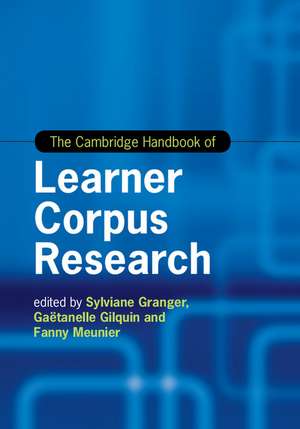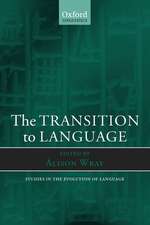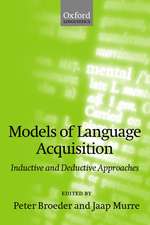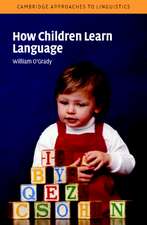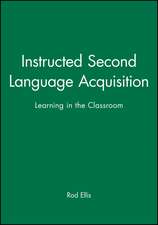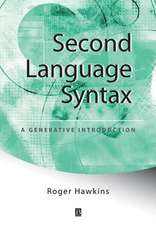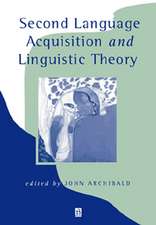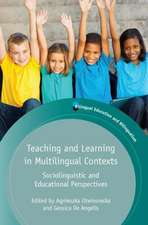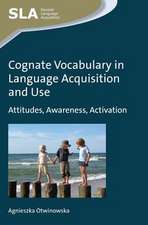The Cambridge Handbook of Learner Corpus Research: Cambridge Handbooks in Language and Linguistics
Editat de Sylviane Granger, Gaëtanelle Gilquin, Fanny Meunieren Limba Engleză Hardback – 30 sep 2015
Din seria Cambridge Handbooks in Language and Linguistics
-
 Preț: 257.36 lei
Preț: 257.36 lei -
 Preț: 419.59 lei
Preț: 419.59 lei -
 Preț: 282.02 lei
Preț: 282.02 lei - 14%
 Preț: 989.27 lei
Preț: 989.27 lei - 23%
 Preț: 982.81 lei
Preț: 982.81 lei -
 Preț: 421.83 lei
Preț: 421.83 lei -
 Preț: 284.81 lei
Preț: 284.81 lei -
 Preț: 338.63 lei
Preț: 338.63 lei -
 Preț: 297.50 lei
Preț: 297.50 lei -
 Preț: 280.50 lei
Preț: 280.50 lei -
 Preț: 285.18 lei
Preț: 285.18 lei -
 Preț: 284.94 lei
Preț: 284.94 lei -
 Preț: 281.54 lei
Preț: 281.54 lei -
 Preț: 280.68 lei
Preț: 280.68 lei - 19%
 Preț: 495.90 lei
Preț: 495.90 lei -
 Preț: 417.90 lei
Preț: 417.90 lei - 14%
 Preț: 880.33 lei
Preț: 880.33 lei -
 Preț: 419.23 lei
Preț: 419.23 lei -
 Preț: 315.15 lei
Preț: 315.15 lei - 23%
 Preț: 977.84 lei
Preț: 977.84 lei - 23%
 Preț: 1493.38 lei
Preț: 1493.38 lei -
 Preț: 419.93 lei
Preț: 419.93 lei - 19%
 Preț: 451.06 lei
Preț: 451.06 lei - 23%
 Preț: 949.77 lei
Preț: 949.77 lei - 14%
 Preț: 989.06 lei
Preț: 989.06 lei -
 Preț: 347.32 lei
Preț: 347.32 lei -
 Preț: 370.92 lei
Preț: 370.92 lei - 23%
 Preț: 1075.01 lei
Preț: 1075.01 lei - 23%
 Preț: 1023.97 lei
Preț: 1023.97 lei - 11%
 Preț: 507.18 lei
Preț: 507.18 lei - 23%
 Preț: 753.13 lei
Preț: 753.13 lei -
 Preț: 473.75 lei
Preț: 473.75 lei -
 Preț: 468.73 lei
Preț: 468.73 lei - 23%
 Preț: 1027.19 lei
Preț: 1027.19 lei -
 Preț: 398.99 lei
Preț: 398.99 lei -
 Preț: 398.39 lei
Preț: 398.39 lei
Preț: 1066.00 lei
Preț vechi: 1384.41 lei
-23% Nou
Puncte Express: 1599
Preț estimativ în valută:
204.01€ • 212.20$ • 168.42£
204.01€ • 212.20$ • 168.42£
Carte tipărită la comandă
Livrare economică 15-29 aprilie
Preluare comenzi: 021 569.72.76
Specificații
ISBN-13: 9781107041196
ISBN-10: 1107041198
Pagini: 761
Ilustrații: 16 b/w illus. 24 tables
Dimensiuni: 185 x 253 x 35 mm
Greutate: 1.61 kg
Editura: Cambridge University Press
Colecția Cambridge University Press
Seria Cambridge Handbooks in Language and Linguistics
Locul publicării:New York, United States
ISBN-10: 1107041198
Pagini: 761
Ilustrații: 16 b/w illus. 24 tables
Dimensiuni: 185 x 253 x 35 mm
Greutate: 1.61 kg
Editura: Cambridge University Press
Colecția Cambridge University Press
Seria Cambridge Handbooks in Language and Linguistics
Locul publicării:New York, United States
Cuprins
1. Introduction: learner corpus research – past, present and future Sylviane Granger, Gaëtanelle Gilquin and Fanny Meunier; Part I. Learner Corpus Design and Methodology: 2. From design to collection of learner corpora Gaëtanelle Gilquin; 3. Learner corpus methodology Marcus Callies; 4. Learner corpora and psycholinguistics Philip Durrant and Anna Siyanova-Chanturia; 5. Annotating learner corpora Bertus van Rooy; 6. Speech annotation of learner corpora Nicolas Ballier and Philippe Martin; 7. Error annotation systems Anke Lüdeling and Hagen Hirschmann; 8. Statistics for learner corpus research Stefan Th. Gries; Part II. Analysis of Learner Language: 9. Learner corpora and lexis Tom Cobb and Marlise Horst; 10. Learner corpora and phraseology Signe Oksefjell Ebeling and Hilde Hasselgård; 11. Learner corpora and grammar Tom Rankin; 12. Learner corpora and discourse JoAnne Neff-van Aertselaer; 13. Learner corpora and pragmatics Nina Vyatkina and Joseph Cunningham; Part III. Learner Corpus Research and Second Language Acquisition: 14. Second language acquisition theory and learner corpus research Florence Myles; 15. Transfer and learner corpus research John Osborne; 16. Learner corpora and formulaic language in second language acquisition research Nick C. Ellis, Rita Simpson-Vlach, Ute Römer, Matthew Brook O'Donnell and Stefanie Wulff; 17. Developmental patterns in learner corpora Fanny Meunier; 18. Variability in learner corpora Annelie Ädel; 19. Learner corpora and learning context Joybrato Mukherjee and Sandra Götz; Part IV. Learner Corpus Research and Language Teaching: 20. The learner corpus as a pedagogic corpus Angela Chambers; 21. Learner corpora and language for academic and specific purposes Lynne Flowerdew; 22. The contribution of learner corpora to reference and instructional materials design Sylviane Granger; 23. Learner corpora and language testing Fiona Barker, Angeliki Salamoura and Nick Saville; Part V. Learner Corpus Research and Natural Language Processing: 24. Learner corpora and natural language processing Detmar Meurers; 25. Automatic grammar- and spell-checking for language learners Claudia Leacock, Martin Chodorow and Joel Tetreault; 26. Learner corpora and automated scoring Derrick Higgins, Chaitanya Ramineni and Klaus Zechner; 27. Learner corpora and native language identification Scott Jarvis and Magali Paquot.
Recenzii
'A fantastic book - very comprehensive, with all the advantages of a common layout for each chapter, but also benefiting from the unique and individual insights of experts in the subject.' Susan Hunston, University of Birmingham
'A tremendous accomplishment, this handbook will serve as the main reference in learner corpus research for years to come. It really lives up to the name 'handbook', not just in the crucial sense of a 'how-to' guide but also as an overview of the field, its development, and state-of-the-art research practices and findings.' Alex Boulton, University of Lorraine and Centre National de la Recherche Scientifique (CNRS), Paris
'In an age when handbooks abound, The Cambridge Handbook of Learner Corpus Research sets itself apart by its breadth and depth of coverage. Even a quick glance at the table of contents provides the reader with a sense of the tremendous scope of learner corpus research (LCR) covered in the handbook. … The Cambridge Handbook of Learner Corpus Research is a valuable addition to the increasingly relevant and multifaceted field of LCR.' Randi Reppen, The International Journal of Learner Corpus Research
'A tremendous accomplishment, this handbook will serve as the main reference in learner corpus research for years to come. It really lives up to the name 'handbook', not just in the crucial sense of a 'how-to' guide but also as an overview of the field, its development, and state-of-the-art research practices and findings.' Alex Boulton, University of Lorraine and Centre National de la Recherche Scientifique (CNRS), Paris
'In an age when handbooks abound, The Cambridge Handbook of Learner Corpus Research sets itself apart by its breadth and depth of coverage. Even a quick glance at the table of contents provides the reader with a sense of the tremendous scope of learner corpus research (LCR) covered in the handbook. … The Cambridge Handbook of Learner Corpus Research is a valuable addition to the increasingly relevant and multifaceted field of LCR.' Randi Reppen, The International Journal of Learner Corpus Research
Descriere
An accessible and comprehensive survey of a fast-growing field, this Handbook explores the many interdisciplinary applications of learner corpus research.
